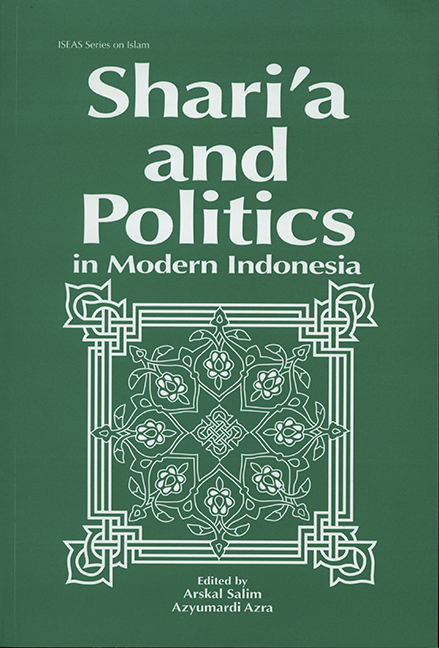Book contents
- Frontmatter
- Contents
- Acknowledgments
- List of Contributors
- Glossary
- 1 INTRODUCTION: The State and Shari'a in the Perspective of Indonesian Legal Politics
- 2 LAW AND POLITICS IN POST-INDEPENDENCE INDONESIA:A Case Study of Religious and Adat Courts
- 3 THE STATE AND SHARI'A IN INDONESIA
- 4 THE STATE'S LEGAL POLICY AND THE DEVELOPMENT OF ISLAMIC LAW IN INDONESIA'S NEW ORDER
- 5 THE INDONESIAN MARRIAGE LAW OF 1974: An Institutionalization of the Shari'a for Social Changes
- 6 INDONESIA'S 1989 RELIGIOUS JUDICATURE ACT: Islamization of Indonesia or Indonesianization of Islam?
- 7 THE POLITICAL BACKDROP OF THE ENACTMENT OF THE COMPILATION OF ISLAMIC LAWS IN INDONESIA
- 8 ISLAMIZING CAPITALISM: On the Founding of Indonesia's First Islamic Bank
- 9 FATWA AND POLITICS IN INDONESIA
- 10 ZAKAT ADMINISTRATION IN POLITICS OF INDONESIAN NEW ORDER
- 11 ISLAMIC VALUES, LAW AND EXPECTATIONS IN CONTEMPORARY INDONESIA
- 12 EPILOGUE: Shari'a in Indonesia's Current Transition: An Update
- APPENDICES
- Bibliography
- Index
6 - INDONESIA'S 1989 RELIGIOUS JUDICATURE ACT: Islamization of Indonesia or Indonesianization of Islam?
Published online by Cambridge University Press: 21 October 2015
- Frontmatter
- Contents
- Acknowledgments
- List of Contributors
- Glossary
- 1 INTRODUCTION: The State and Shari'a in the Perspective of Indonesian Legal Politics
- 2 LAW AND POLITICS IN POST-INDEPENDENCE INDONESIA:A Case Study of Religious and Adat Courts
- 3 THE STATE AND SHARI'A IN INDONESIA
- 4 THE STATE'S LEGAL POLICY AND THE DEVELOPMENT OF ISLAMIC LAW IN INDONESIA'S NEW ORDER
- 5 THE INDONESIAN MARRIAGE LAW OF 1974: An Institutionalization of the Shari'a for Social Changes
- 6 INDONESIA'S 1989 RELIGIOUS JUDICATURE ACT: Islamization of Indonesia or Indonesianization of Islam?
- 7 THE POLITICAL BACKDROP OF THE ENACTMENT OF THE COMPILATION OF ISLAMIC LAWS IN INDONESIA
- 8 ISLAMIZING CAPITALISM: On the Founding of Indonesia's First Islamic Bank
- 9 FATWA AND POLITICS IN INDONESIA
- 10 ZAKAT ADMINISTRATION IN POLITICS OF INDONESIAN NEW ORDER
- 11 ISLAMIC VALUES, LAW AND EXPECTATIONS IN CONTEMPORARY INDONESIA
- 12 EPILOGUE: Shari'a in Indonesia's Current Transition: An Update
- APPENDICES
- Bibliography
- Index
Summary
Introduction
In 1989 the Indonesian legislature passed and President Suharto signed a new law governing the country's Islamic courts. The statute, known as the Religious Judicature Act2 (the Act), significantly enhanced the legal and institutional standing of the Islamic courts by providing formal legal guarantees of their security and increasing the level of state support. The Act also expanded and equalized the courts' powers. Prior to the passage of the Act the substantive competence of Islamic courts on the populous islands of Java and Madura extended only to matters of marriage and divorce. The 1989 Act expanded the Islamic courts' jurisdiction to include inheritance throughout the country. The Act also strengthened the standing of the Islamic courts in relation to the civil courts by eliminating a rule dating from the nineteenth century which had required that decisions of Islamic courts must be ratified by a civil court to be enforceable.
The enactment of the Religious Judicature Act seemed to signal a reversal in New Order policy on the role of religion in public life and the enforcement of Islamic Law. Although Islamic interests provided critical support in President Suharto's rise to power in the mid-1960s, the regime's actions over the ensuing two decades did not support Islamic involvement in the exercise of state power. Once in control, the New Order set about systematically to neutralize Islam as a basis for political and legal mobilization. Most observers in the 1970s would have found it unthinkable that in the 1990s the Suharto government would be actively promoting state enforcement of Islamic doctrine.
This article seeks to place these recent developments in Islamic law in a broader context, and qualifies the initial assessment of their importance. Though significant, the Religious Judicature Act does not mark the dramatic shift in policy that at first blush it seems to indicate. Rather, it is to a large extent the culmination of events set in motion twenty years earlier. Moreover, while the Suharto government is clearly presenting a more Islamic demeanor, it has not abandoned its historic policy of controlling Islamic law and politics.
- Type
- Chapter
- Information
- Shari'a and Politics in Modern Indonesia , pp. 96 - 124Publisher: ISEAS–Yusof Ishak InstitutePrint publication year: 2003



